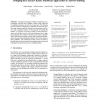275 search results - page 23 / 55 » Learning about and through Empirical Modelling |
111
click to vote
JMLR
2012
13 years 2 months ago
2012
Often when modeling structured domains, it is desirable to leverage information that is not naturally expressed as simply a label. Examples include knowledge about the evaluation ...
SIGIR
2000
ACM
15 years 4 months ago
2000
ACM
Abstract This paper investigates whether a machine can automatically learn the task of finding, within a large collection of candidate responses, the answers to questions. The lea...
JMLR
2010
14 years 6 months ago
2010
Much recent research has been devoted to learning algorithms for deep architectures such as Deep Belief Networks and stacks of auto-encoder variants, with impressive results obtai...
123
click to vote
FGR
2004
IEEE
15 years 3 months ago
2004
IEEE
Tracking a moving person is challenging because a person's appearance in images changes significantly due to articulation, viewpoint changes, and lighting variation across a ...
118
click to vote
COGSR
2011
14 years 6 months ago
2011
We simulate the evolution of a domain vocabulary in small communities. Empirical data show that human communicators can evolve graphical languages quickly in a constrained task (P...

